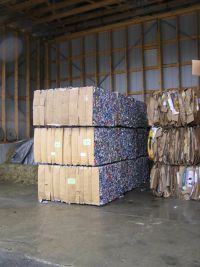
Site Owned by Upper Valley Lake Sunapee Regional Planning Commission
Most towns provide some type of recycling. Go to the "Waste Collection" page for links to each towns recycling information. The materials accepted often change according to the market. Some towns will keep the items they take constant even when there are no markets for the materials. They may feel it's worth stockpiling a material until the market changes so they don't have to re-educate their residents to stop bringing a certain item for a short period of time and then teaching them to bring it again later.
Recycling turns materials that would otherwise become waste into valuable resources. In 2007, it cost New Hampshire towns and cities

Bales of Recycled Materials, Charlestown Transfer Station
$116 million to dispose of waste, yet every 1 percent increase in the recycling rate represents at least a savings of $1 million! Recent news reports, however, have indicated that there is no market for recyclables—these reports are wrong! Recyclables are still a valuable commodity, despite their lower market prices. We should not forget the environmental benefits of recycling vs. landfilling our wastes. With an average cost of $75 per ton for disposal, not including transportation, the cost avoidance is still substantial and makes recycling still attractive. (NH DES)
Collecting used bottles, cans, and newspapers and taking them to the curb or to a collection facility is just the first in a series of steps that generates a host of financial, environmental, and social returns. Some of these benefits accrue locally as well as globally. The next step is to manufacture products from the collected materials. The final step is critical—and it's up to us: we must buy products that are made from recycled materials. Read labels on paper products and look for something like, "contains post-consumer paper." The higher the percentage of post-consumer paper, the more you're supporting recycling programs. It's important to look for "post-consumer" as this is materials used by us and not simply scrap materials on the manufacturer's floor that would have been recycled anyway. Most paperboard (egg cartons, food boxes—if they tear brown or gray), glass, steel cans, and aluminum cans are made from post-consumer recycled materials. Many plastics cannot be recycled for reuse.
Offices can make a difference by inserting a recycled content clause into their purchasing policy. Other considerations include looking at the vendor and manufacturer location to save energy costs including pollution from long-distance transport.
SITE SEARCH